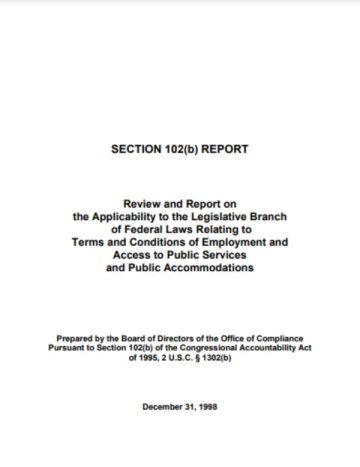EXECUTIVE SUMMARY
In this Report, issued under section 102(b) of the Congressional Accountability Act of 1995 (“CAA”), the Board of Directors of the Office of Compliance reviews new statutes or statutory amendments enacted after the Board’s 1996 Report was prepared, and recommends that certain other inapplicable laws should be made applicable to the legislative branch. In the second part of this Report, the Board reviews inapplicable provisions of the private-sector laws generally made applicable by the CAA (the “CAA laws”),1 and reports on whether and to what degree these provisions should be made applicable to the legislative branch. Finally, the Board reviews and makes recommendations on whether to make the CAA or another body of laws applicable to the General Accounting Office (“GAO”), the Government Printing Office (“GPO”), and the Library of Congress (“Library”).
Part I
After reviewing all federal laws and amendments relating to terms and conditions of employment or access to public accommodations and services passed since October, 1996, the Board concludes that no new provisions of law should be made applicable to the legislative branch. Two laws relating to terms and conditions of employment were amended, but substantial provisions of each law have already been made applicable to the legislative branch. However, the provisions of private-sector law which the Board identified in 1996 in its first Section 102(b) Report as having little or no application in the legislative branch have not yet been made applicable, and the Board’s experience inthe administration and enforcement of the Act in the two years since that first report was submitted to Congress has raised several new issues.
Based on the work of the 1996 Section 102(b) Report, the Board makes the
following two sets of recommendations.
(1) The Board resubmits the recommendations made in the 1996 Section 102(b) Report that the following provisions of laws be applied to employing offices within the legislative branch: Prohibition Against Discrimination on the Basis of Bankruptcy (11 U.S.C. § 525); Prohibition Against Discharge from Employment by Reason of Garnishment (15 U.S.C. § 1674(a)); Prohibition Against Discrimination on the Basis of Jury Duty (28 U.S.C. § 1875); Titles II and III of the Civil Rights Act of 1964 (42 U.S.C. §§ 2000(a) to 2000a-6, 2000b to 2000b-3) (prohibiting discrimination on the basis of race, color, religion, or national origin regarding the goods, services, facilities, privileges, advantages, and accommodations of any place of public accommodation as defined in the Act).
(2) After further study of the whistleblower provisions of the environmental laws (15 U.S.C. § 2622; 33 U.S.C. § 1367; 42 U.S.C. §§ 300j–9(i), 5851, 6971, 7622, 9610) on which the Board had previously deferred decision, the Board now concludes that the better construction of these provisions is that they cover the legislative branch. However, because arguments could be made to the contrary, the Board recommends that language should be added to make clear that all entities within the legislative branch are covered by these provisions.
